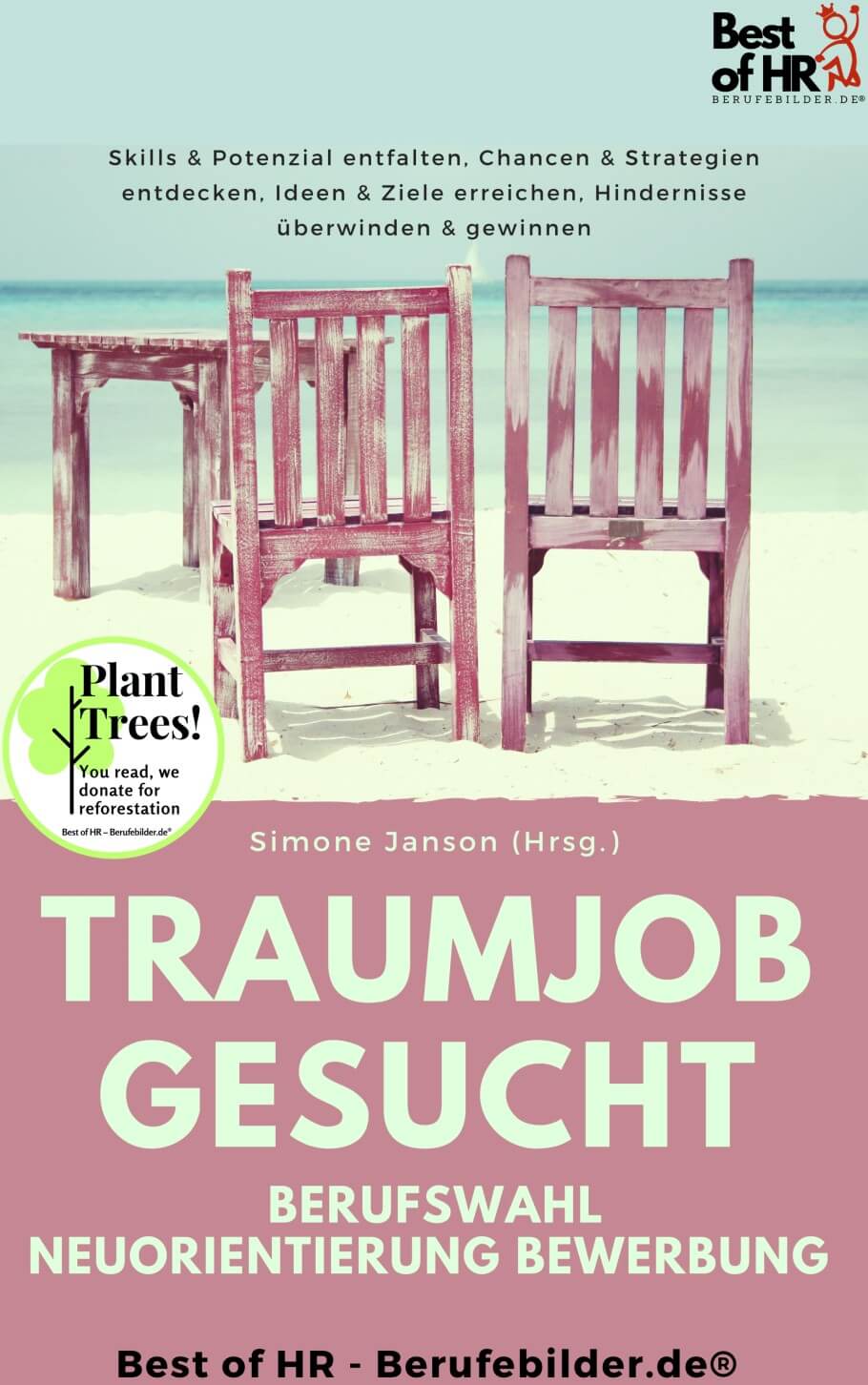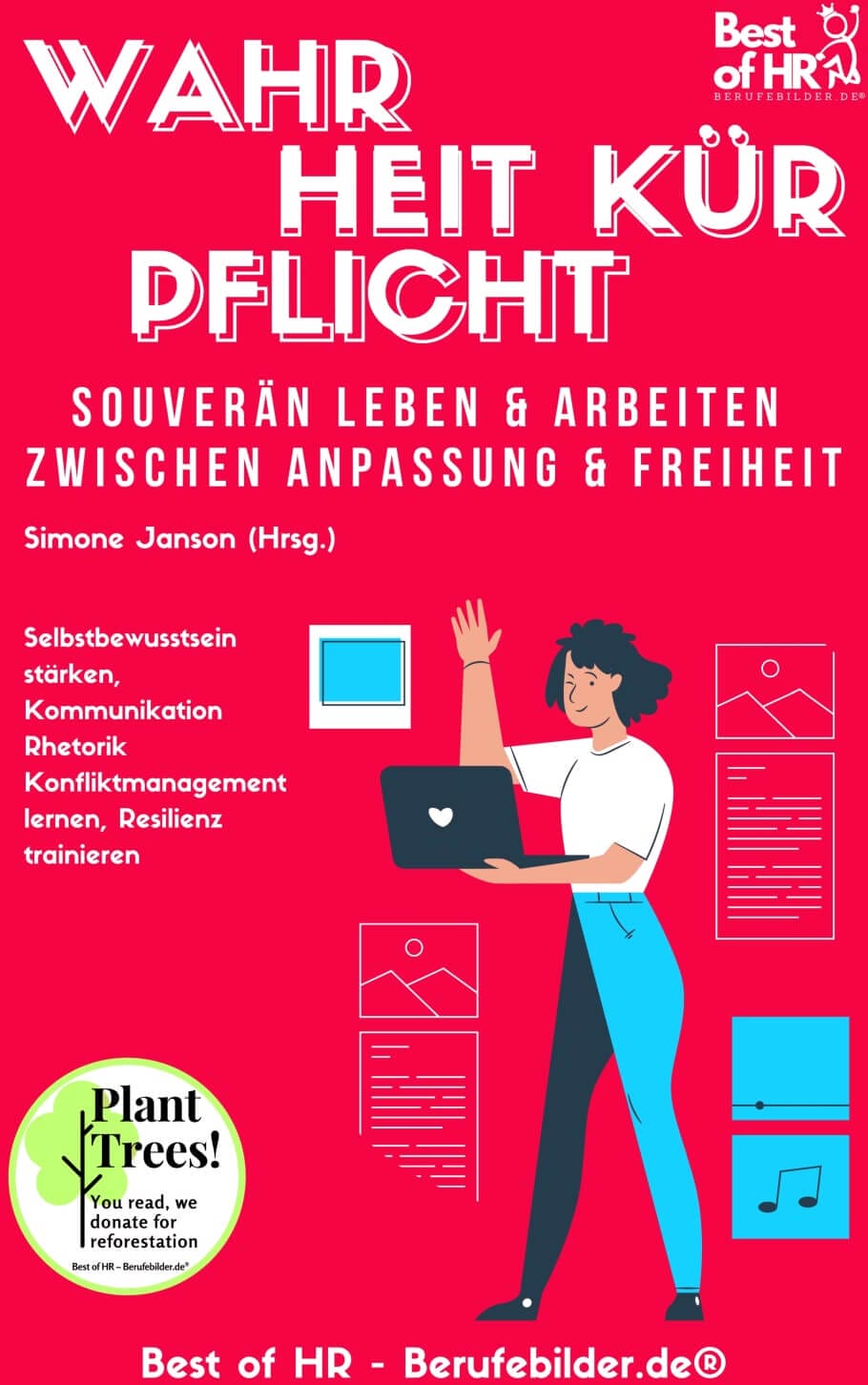For their successful, good life Information you really need: Government-funded publisher, awarded the Global Business Award as Publisher of the Year: Books, Shops, eCourses, data-driven AI-Services. Print and online publications as well as the latest technology go hand in hand - with over 20 years of experience, partners like this Federal Ministry of Education, customers like Samsung, DELL, Telekom or universities. behind it Simone Janson, German Top 10 blogger, referenced in ARD, FAZ, ZEIT, WELT, Wikipedia.
Disclosure & Copyright: Our articles are written and edited by humans, and in some cases like this, we use the assistance of artificial intelligence to optimize texts. Image material created as part of a free cooperation with Shutterstock.
Changing success strategies: 3 X 8 concrete resilience tips for adapting to the digital working world of the future
By Simone Janson (More) • Last updated on October 02.02.2024, XNUMX • First published on 01.02.2024/XNUMX/XNUMX • So far 7898 readers, 3906 social media shares Likes & Reviews (5 / 5) • Read & write comments
Digitalization, globalization and, last but not least, artificial Intelligence offer many opportunities, but also professional challenges. How do you specifically prepare for this?

- Resilience: If you want to be successful in the long term, you have to adapt to change
- 8 Opportunities & Risks: What will the working world of the future look like?
- What is meant by a career strategy?
- 8 success strategies that are particularly promising: Which skills should you master particularly well?
- 8 concrete tips: This is the best way to implement your success strategies.
- Where can I learn the skills of the future?
- Conclusion: The working world of the future offers many opportunities that need to be planned well
- Top books on the subject
- Read text as PDF
- Advice on success, goal achievement or marketing
- Book eCourse on Demand
- Skate eBook as desired
Resilience: If you want to be successful in the long term, you have to adapt to change
No doubt that Working world is undergoing profound change: advancing digitalization as well as social and economic changes have created a new era of professional opportunities that is exciting but also challenging at the same time.
If you want to be successful here, you will inevitably have to adapt to the new working world. resilience is asked! And Success Many people want (or need) to have it today People, be it to fulfill the demands placed on yourself or simply to “get your life on track”.
This article takes you on a journey through aspects of the modern world of work and shows you how you can adapt your career strategy to succeed in this new, very dynamic environment.
8 Opportunities & Risks: What will the working world of the future look like?
The books on the subject (advertising)
The new world of work is a complex and dynamic structure that is shaped by various factors. We l
- digitization: One of the most significant changes is undoubtedly the advancing digitalization. Modern technologies such as artificial intelligence, machine learning and big data analysis are present in almost all industries, leading to a fundamental change in the way we work. Automation and robotic processes are impacting not only manufacturing-oriented areas, but also traditional service sectors.
- Globalization: Another feature of the new world of work is increased globalization. Companies no longer operate exclusively on a national level, but rather operate in a global context. As a result, employees increasingly work with international teams and have to deal with intercultural challenges. The ability to interculturally communicate and collaborate becomes a key competency.
- Demographic change: Aging society is a problem that primarily affects the Western world. The demographic change is leading to an increased shortage of skilled workers, as well as an increasing need for flexible working models and further training opportunities. The younger Generation Z in particular has new demands on the world of work, such as a desire for meaningful work and a work-life balance
- Flexibility and agility are also characteristic of the modern working world. Traditional hierarchies and rigid organizational structures soft agile working models. Companies are increasingly recognizing the importance of flexibility and adaptability in the face of rapidly changing market conditions. Flexible working hours, part-time work, remote work and project-based collaboration are becoming increasingly important. This also opens up new opportunities for employees to organize their work more flexibly and to better combine work and private life.
- The boundaries between work and leisure are becoming increasingly blurred in the new world of work. Thanks to the spread of digital technologies, employees are connected everywhere and at all times. Home office and mobile working are no longer just exceptions, but are increasingly part of normality. This development requires a conscious work-life balance to prevent burnout and overwork.
- Climate change: Due to climate change, environmentally friendly products and services are becoming increasingly important. The focus is on the development of sustainable, resource-saving business models
- Social questions: At the same time, however, there is also an imbalance in the labor market, for example due to a shortage of skilled workers in some areas and unemployment in other areas, which creates the risk of social division in the demarcation between highly qualified and low-qualified workers.
- Values: And finally, the increasing importance of values and corporate culture is an important aspect. Today's employees place greater value on ethical principles, social responsibility and meaningfulness in their professional activities. Companies that integrate these values and promote a positive corporate culture not only have a better chance of attracting talented employees, but also of retaining them in the long term.
What is meant by a career strategy?
A career strategy is a comprehensive, targeted plan that is individually designed to achieve professional goals Set to define, pursue and ultimately achieve. This strategy forms a kind of roadmap that targets not only short-term career goals, but also the long-term professional development of an individual. It integrates various aspects, including professional skills and personal ones Power and weaknesses, current market requirements as well as individual values and preferences.
An effective career strategy goes beyond simply wanting something specific Job or one position. It first requires self-reflection to find out individual skills, interests and values. This process in turn makes it possible klare and set realistic goals that take into account not only current status but also long-term professional ambitions.
8 success strategies that are particularly promising: Which skills should you master particularly well?
Discounts for your success (advertising)!
successStrategies in today's working world are characterized by their adaptability, willingness to innovate and the targeted further development of key skills. Below are some key aspects that are particularly relevant in successful strategies:
- Agility and flexibility: In an increasingly rapidly changing world of work, the ability to adapt is crucial. Agility and flexibility make it possible to adapt to rapidly changing market conditions. This includes, for example, the willingness to take on new tasks, prove yourself in different roles and even change jobs or industries if this contributes to personal and professional development.
- Interdisciplinary skills: The boundaries between traditional professional fields are becoming increasingly blurred. Promising career strategies take this development into account and promote interdisciplinary skills. The ability to think beyond your own field of expertise is becoming increasingly important. This could mean, for example, that a marketing expert acquires basic knowledge of data analysis or an engineer receives further training in project management issues.
- Digital skills: Advancing digitalization is affecting almost all industries. Successful career strategies therefore rely on the continuous development and expansion of digital skills. This includes not only technical skills, but also a basic understanding of digital trends, data protection, cybersecurity and much more. The willingness to deal with new technologies is crucial for this.
- Strong soft skills: In addition to technical skills, soft skills are of central importance. Communication skills, teamwork, creativity and problem-solving skills are now more in demand than ever. Companies are looking for employees who not only have technical expertise, but also the social skills to work effectively in a team and communicate with customers.
- Willingness for lifelong learning: A successful career strategy also includes the principle of lifelong learning. The willingness to continuously educate yourself and acquire new skills is essential. Various educational paths such as further training, seminars or study programs, but also informal learning and digital learning platforms can be used for this purpose.
- Building a personal network: Networking remains a thing Key factor for professional success. Building and maintaining a strong professional network not only opens up professional opportunities, but also provides the opportunity to exchange experiences, knowledge and potential tips. Networking can be done both in person and online via platforms such as XING, LinkedIn, etc.
- Entrepreneurial thinking: Even if you are not self-employed, entrepreneurial thinking is a valuable skill for your own successful life. Means: Act proactively, recognize opportunities and make responsible decisions. Employees who view their actions in the context of the company's goals and can propose innovative solutions increase their chances of professional success enormously.
- Continuous self-reflection: Successful strategies also include regular self-reflection. This makes it possible to review your own goals, evaluate progress and make adjustments if necessary. Note: Self-confidence (not overestimation of yourself!) in relation to your own strengths and weaknesses is crucial for effective planning for success.
8 concrete tips: This is the best way to implement your success strategies.
If you now want to put your success strategies into action, there is no way around thorough, extensive and precise planning. The following 8 steps you should take this into account:
- Strengths and weaknesses: As already mentioned, implementing your success strategy first requires a careful analysis of your personal strengths, weaknesses, goals and values. Start with self-reflection to clarify your career ambitions.
- Use the information available: In addition, use information on the Internet and books to find out how best to carry out self-reflection so that optimal results can be achieved.
- Set smart goals: Then set clear, realistic goals and create a flexible plan that allows enough room for adjustments. Invest as much time as possible in building a strong professional network, as relationships are often crucial to professional success - even more than personal skills. Finally, always remain open to change and adapt your strategy as market conditions evolve.
- Intermediate goals: Every solid success strategy includes the definition of intermediate goals that should be achieved on the way to the long-term goals. These intermediate goals can be, for example, further training, professional networks or the acquisition of specific skills.
- Stay flexible: The strategy must be flexible enough to be able to react to unforeseen developments or changing personal priorities.
- Adaptation of professional skills through further training: An important component of this is the continuous development of professional skills. In the rapidly changing world of work, the introduction of new technologies and working methods has become normal. The strategy should therefore include measures to improve existing skills and acquire new skills - e.g. B. through further training, self-study or participation in industry-specific events.
- Networking is another crucial aspect of a successful career strategy. Making connections, both within and outside of your current work environment, not only broadens your horizons but also creates potential career opportunities. A well-maintained professional network can help you stay informed about current developments and gain access to new professional opportunities.
- Adjustment: And last but not least, continuous evaluation and adjustment of the strategy plays an important role. Changes in your personal life situation, on the job market or in the industry require you to regularly review your strategy and adapt it if necessary. This process ensures that your strategy is always up to date and tailored to current conditions.
Where can I learn the skills of the future?
Flexibility, adaptation and therefore above all Further Training are important steps on the way to your personal success. But how can you specifically acquire the skills you need? The good news is that there are plenty of resources to learn and improve the skills you need. Online-Platforms, continuing education programs, specialist books and Networking-Events offer a wealth of opportunities to expand your knowledge. Universities, technical colleges and professional associations also offer specific programs to deepen your professional skills. A key aspect is being open to lifelong Things to Learn and to filter out those resources that best suit your personal wishes and needs.
But not all resources are available freely and free of charge; appropriate further training and information are sometimes even really expensive. Although there are scholarships and state funding such as BAföG, obtaining these is often linked to complicated conditions. Hence the Financing an exit or Further Training Another option is through loans. For example, there is an education loan, a government-sponsored loan that was specifically designed to finance training and further education. It is characterized by favorable conditions such as low interest rates and flexible repayment options. In addition to the education loan, it is possible to use a regular bank loan to finance training or further education. Its conditions should be compared carefully and your own repayment options should be realistically assessed so that you are not stuck with interest rates that are too high in the long term. But even then there are still options like that Refinancing of old loan burdens.
Conclusion: The working world of the future offers many opportunities that need to be planned well
The new working world offers a wide range of opportunities, but also requires continuous adaptation and further development of your personal success strategy and your skills. Flexibility, interdisciplinary skills and lifelong learning are crucial to long-term success in such a dynamic environment. Use the numerous resources for expanding your skills that we have listed in this article. to plan Carefully consider your career and always remain open to new opportunities.
However, you should always take the financial side into account, especially when it comes to expensive training and further education, because a loan can fast lead to long-term, high debt burdens and even insolvency, which is why alternative financing options such as scholarships and government funding should always be included in the financing considerations. After all, a successful career in the modern working world begins with a clever and agile success strategy!
Top books on the subject
Read text as PDF
Acquire this text as a PDF (only for own use without passing it on according to Terms and conditions): Please send us one after purchase eMail with the desired title supportberufebilder.de, we will then send the PDF to you immediately. You can also purchase text series.
4,99€Buy
Advice on success, goal achievement or marketing
You have Ask about career, Recruiting, personal development or increasing reach? Our AIAdviser helps you for 5 euros a month – free for book buyers. We offer special ones for other topics IT services
5,00€ / per month Book
Book eCourse on Demand
Up to 30 lessons with 4 learning tasks each + final lesson as a PDF download. Please send us one after purchase eMail with the desired title supportberufebilder.de. Alternatively, we would be happy to put your course together for you or offer you a personal, regular one eMail-Course - all further information!
29,99€Buy
Skate eBook as desired
If our store does not offer you your desired topic: We will be happy to put together a book according to your wishes and deliver it in a format of yours Choice. Please sign us after purchase supportberufebilder.de
79,99€Buy
Here writes for you
 Simone Janson is publisher, Consultant and one of the 10 most important German bloggers Blogger Relevance Index. She is also head of the Institute's job pictures Yourweb, with which she donates money for sustainable projects. According to ZEIT owns her trademarked blog Best of HR – Berufebilder.de® to the most important blogs for careers, professions and the world of work. More about her im Career. All texts by Simone Janson.
Simone Janson is publisher, Consultant and one of the 10 most important German bloggers Blogger Relevance Index. She is also head of the Institute's job pictures Yourweb, with which she donates money for sustainable projects. According to ZEIT owns her trademarked blog Best of HR – Berufebilder.de® to the most important blogs for careers, professions and the world of work. More about her im Career. All texts by Simone Janson.

















![Self-employment & business start-ups: Am I a start-up type? [+ Checklist] Self-employment & business start-ups: Am I a start-up type? [+ Checklist]](https://e68zy2pxt2x.exactdn.com/wp-content/uploads/2018/existenzgruendung-selbstaendig-gruender-idee.jpg?strip=all&lossy=1&ssl=1)

Post a Comment